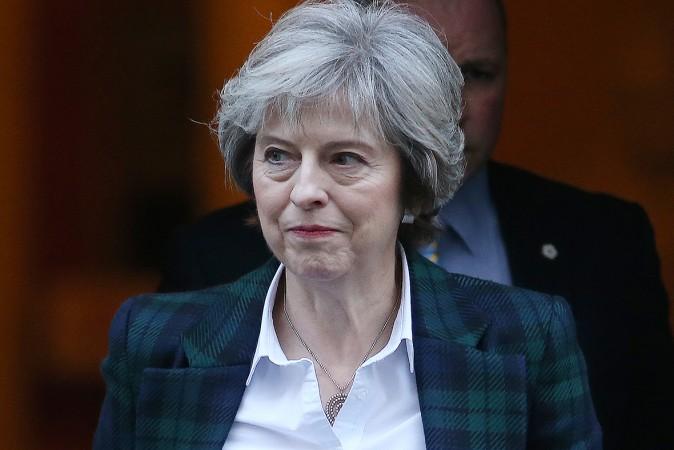
British Prime Minister Theresa May on Tuesday signed the historic letter informing the European Council President, Donald Tusk, of Britain's intention to leave the European Union (EU).
The letter will be delivered by Britain's EU ambassador Tim Barrow to Tusk around 1130 GMT on Wednesday. May, by signing the letter, has triggered Article 50 of the EU's Lisbon Treaty, setting the clock ticking on a two-year negotiating period to terminate UK's 44-year-long membership of the European bloc.
May will announce the triggering of Article 50 in a speech in the House of Commons on Wednesday. In her statement, the UK PM is expected to explain the content of the letter, which could be upto eight pages long.
What is Article 50?
Article 50 is a 265-word passage of the Lisbon Treaty which states how a EU member can leave the bloc voluntarily. The Treaty forms the constitutional basis of the EU.
May has sent the letter, what happens next?
According to the European Council President, the EU leaders will have to respond to the letter with "draft Brexit guidelines" within 48 hours, which gives Tusk time until Friday.
Great Repeal Bill
Now that May has triggered Article 50, the UK government will present its "Great Repeal Bill" to parliament on Thursday. Brexit Secretary David Davis will publish the bill, which will bring an end to the supremacy of EU law.
EU leaders to hold a meeting in April
The European Union leaders from all the 27 member states will hold an emergency summit on April 29, where exit negotiations with the UK are expected to be discussed. Reports state that the formal negotiations are not likely to take place until after the French presidential elections on May 7, 2017.
After the countries finalise their objectives for Brexit, these instructions will be given to the European Commission's chief negotiator Michael Barnier. However, it could be weeks before the formal talks of the negotiations begin as the European Parliament will likely want a say in the talks.
Who will participate in Brexit negotiations?
The negotiations will be led by the Secretary for State for Exiting the EU David Davis and the talks will primarily be overseen by Theresa May. The lead negotiator from the EU's side will be Michael Barnier, in assistance with the Belgian Didier Seeuws, a former chief of Herman Van Rompuy, and a team of 30 other officials.
How long will it take for negotiations?
After triggering Article 50, both the sides have two years to complete the negotiations. Barnier, however, has said that the negotiations may even be completed within just 18 months.
Although the negotiations can only taken place after the EC has authorised the guidelines from Britain's exit, which reportedly could take weeks.
What is Britain likely to discuss in the negotiations?
Britain could crash out of the EU without any deals on trade, migration or other substantive issues. Or it could agree to a "hard Brexit", regaining the right to limit EU migration within its borders, but losing access to the single market.
Any new trade deals reached during the negotiations with the EU will require an unanimous vote from all 27 member countries and approval from these countries' national parliaments.
Brexit could break the United Kingdom
Britain's exit from the EU may also break the United Kingdom, prompting Scotland and Northern Ireland — who voted against Brexit — to leave the British union.
Scottish First Minister Nicola Sturgeon, earlier this month, made it clear that a "hard Brexit" will only push Scotland to fight for its second independence referendum.
Just hours before the triggiering of Article 50, the Scottish Parliament on Tuesday voted in favour of a second referendum for its independence from the UK.













